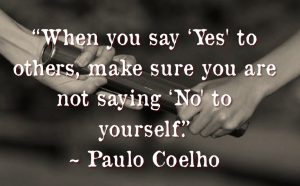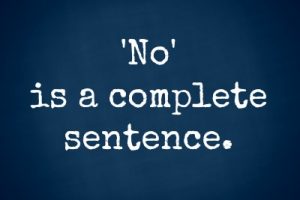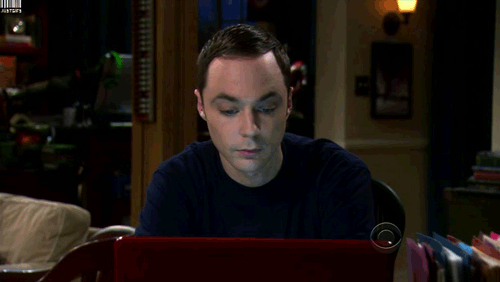It’s a teeny weeny little word and yet it can be so hard to say! (unless you’re a toddler..)
I used to have a lot of trouble with this one – sometimes I still have trouble, truth be told. Why is it so hard?
For most of us saying “no” means riddling ourselves with guilt and being terrified of judgement. People who habitually say “yes” are approvingly described as “selfless” – like that’s a good thing. But is it really a good thing?
Self-less. If you think about it – selfless means “without self”. When we are selfless we are at risk of sacrificing ourselves, our joy, our energy, our time, our mental and physical health.
 But saying “yes” when we need to say “no” can be bad for us.
But saying “yes” when we need to say “no” can be bad for us.
Yet we still do it because sometimes we have what feels like a greater need – the need to be liked, to have the approval of other people. And we believe that saying “yes” gets us this approval.
But what if we are wrong? What if, in saying no, we are still liked? What if we are liked even more? That might sound illogical but bear with me:
When we say “no” we are placing a value on ourselves and on our time and energy. And we are teaching other people to do the same. If we say “no” when we need to, then we have the energy to say “yes” when yes feels right. And our friends and colleagues learn that we mean what we say – we are reliable, honest and we won’t take anyone on a guilt trip (and we won’t be sent on one either!). All good.
But HOW do we say no?
There are four golden rules: 
1 Be quick
2 Be brief
3 Be direct (yet polite)
4 Don’t apologise
QUICK: When we say “Hmmm I need to think about that…” the result is simply that you are dragging it out and making yourself stressed. As soon as you feel your gut screaming “NOOOOO I don’t want to make your wedding cake/ mind your dog for two weeks”, act.
BRIEF, DIRECT & POLITE: If you offer a big long explanation about why you can’t mind the dog, you weaken your position. You are teaching the person that you need to justify your position. Furthermore, to the highly skilled manipulator this is just a fabulous challenge to get around. And you’ll have to find another round about (ineffective) way of saying ‘no’. However if you acknowledge the asker’s need, thank them for considering you as someone who could help, explain that on this occasion you won’t (not can’t), and offer an alternative then you’ve been brief, direct and polite.
DON’T APOLOGISE or take on a victim role. When we accompany a “No” with a “sorry”, then we let the favour-asker know that we feel guilt (again) and that we at some level believe that we are doing something wrong – which we are not!! Weirdly, this makes it more likely they will come back to you in the future with a similar or even more demanding request. They know you feel bad, and they know no-one likes to feel bad, so they KNOW you might just say “Yes” the next time. For them it’s a bet worth making – you’re practically a sure thing.
If we add “I can’t” to the sorry, then we’re in even bigger trouble. It lands (correctly) on the other person as an excuse and an effort at manipulation. “I can’t go because my back is just killing me – I’m on meds for it actually…” isn’t as powerful as “No it doesn’t suit me”, maybe add “but do feel free to ask me again another time” – but only if you mean it!!
Remind yourself: YOUR VALUE DOES NOT DEPEND ON HOW MUCH YOU DO FOR OTHERS. Indeed, by doing what feels comfortable and not doing any more that that, we increase our value in the eyes of others and make ourselves less vulnerable to abuse and manipulation. Intriguingly, well-boundaried people actually like to hear no. It shows them where your boundaries are. 
Of course some people won’t like hearing “no”. They will take it personally and might be cross, grumpy or even passive aggressive (“Oh really? I thought you liked me more/ thought we were closer than that etc. etc.”). But their reaction is not your responsibility and it has nothing to do with your worth.

Give in at your peril – it’s too easy to enslave oneself to an arch manipulator!!
So here’s an example that ticks all the boxes – imagine how these might feel to you:
Friend – “Hi, I’m just wondering could you mind my dog for two weeks while we’re on hols? It’s just that I’d hate to put him in a kennel, he’d be so depressed, and you’re so good with him and he loves you and I wouldn’t trust anyone else to be honest… I’d ask BlaRandomFriend but she’s so selfish she’d probably turn me down even though she said she’d do it once.”
(OK I’ve laid it on pretty thick here now I know – this is a hard one to refuse – you’ve been flattered, emotionally blackmailed and threatened all in one swift, clever attack.)
Perfectly acceptable response #1: How nice of you to ask! It doesn’t suit though – have you thought of asking OtherRandomFriend or HoundHeavenKennel? (That’s not a place, I just made it up…)
Response #2 No, that won’t work for me. I hope you figure something out!

And as Anne Lamott says: “‘No'” is a complete sentence.” It might feel rude, but we all encounter people where this blunt flavour “no” is the only one they’ll hear!
Sheldon nails it 😉


Thank you very much Sally. That is very true but we a human’s and don’t understand lots of in this world.. life is too short for one lesson, and we can’t born again, and have more and more lessons..